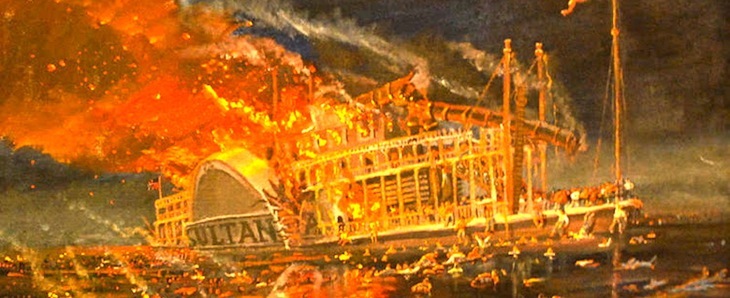Sultana museum fundraising campaign begins
by April 26, 2021 7:40 am 863 views

Had it been a battle during the Civil War, it would have ranked as one of the worst in terms of loss of life. It turns out that when the steamship Sultana exploded on the night of April 27, 1865 in the Mississippi River near Chicken Island in Crittenden County it would become the worst maritime disaster in U.S. history.
A group of civic and business leaders in the region have plotted for years to build a museum to commemorate the disaster, and a new effort to raise money for the project is about to get underway.
On Tuesday (April 27), the Sultana Historical Preservation Society will announce the kick-off of a $7.5 million capital campaign to fund the museum. A press conference will be held at 11:00 a.m. at the proposed site at Briarwood and Military Road in Marion. Featured speaker Gov. Asa Hutchinson plans to commit the support of the state to the project. Other special guest speakers include Kevin Kane, President of Memphis Tourism, Helena West Helena Mayor Kevin Smith and State Senator Keith Ingram.
The future museum will commemorate and honor those who experienced the horrific disaster and preserve a piece of the nation’s history. The Sultana museum is forecasted to attract 50,000 visitors to Marion annually. Those tourists are projected to contribute over $3.5 million dollars in spending in the Delta Region.
The Sultana was a paddle-wheel steamboat commissioned in 1863 on the Mississippi River during the Civil War. It had a maximum capacity of 376 passengers. The boat ultimately ended up in Vicksburg, Miss., at the war’s close. The chief quartermaster at Vicksburg, Lt. Reuben Hatch, had a military past filled with corruption. He was from Illinois and had a powerful ally who secured his position at Vicksburg — President Abraham Lincoln.
Hatch was facing a court-martial tribunal for taking bribes during a stint as the quartermaster in Cairo, Ill. His brother O.M. Hatch was a financial backer and personal friend of Lincoln, and before the court-martial took place, the sitting president sent the judge a letter that ultimately led to the dismissal of charges. Hatch then made his way south.
The Sultana arrived in Vicksburg on April 23, 1865, just days after the war ended and Lincoln had been assassinated. Thousands of Union prisoners of war needed to be transported back to their homes. Many were sick and emaciated. Some were so weak they had to be carried onto the boat.
Greed compelled Hatch to place more than 2,000 soldiers on the Sultana instead of dividing the soldiers between it and other available transport boats. At Hatch’s behest, those efforts were refused. Loaded six times beyond its capacity wasn’t the only problem the Sultana faced. Her boilers were severely damaged and were in need of repair.
Despite those factors, the boat began the churn north at 9 p.m. in the flood-swollen river headed for Cairo. Three boilers exploded late at night three days later. The hot coals, scalding water and fire killed hundreds in the moments following the initial blast.
Marion residents and other boats along the river attempted to save soldiers who were thrown into the chaotic waters. According to history.net, a sailor aboard the U.S.S. Tyler wrote in the ship’s log: “Of all the sounds and noises I ever heard that was the most sorrowful; some cursing, calling for help; and shrieking. I will never forget those awful sounds.”
For many years, it was believed up to 1,800 soldiers were killed that night, making it a worse tragedy than the sinking of the Titanic in 1912. Recent research indicates the number is closer to 1,200, which means more were still killed on the Sultana than killed on the U.S.S. Arizona during the Dec. 7, 1941 attack on Pearl Harbor.
